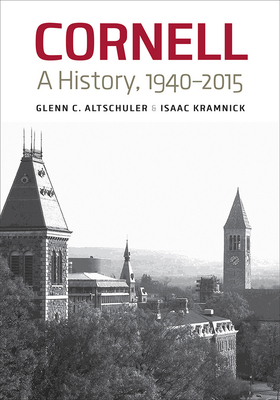Cornell: A History, 1940-2015

Cornell: A History, 1940-2015
In their history of Cornell since 1940, Glenn C. Altschuler and Isaac Kramnick examine the institution in the context of the emergence of the modern research university. The book examines Cornell during the Cold War, the civil rights movement, Vietnam, antiapartheid protests, the ups and downs of varsity athletics, the women's movement, the opening of relations with China, and the creation of Cornell NYC Tech. It relates profound, fascinating, and little-known incidents involving the faculty, administration, and student life, connecting them to the "Cornell idea" of freedom and responsibility. The authors had access to all existing papers of the presidents of Cornell, which deeply informs their respectful but unvarnished portrait of the university. Institutions, like individuals, develop narratives about themselves. Cornell constructed its sense of self, of how it was special and different, on the eve of World War II, when America defended democracy from fascist dictatorship. Cornell's fifth president, Edmund Ezra Day, and Carl Becker, its preeminent historian, discerned what they called a Cornell "soul," a Cornell "character," a Cornell "personality," a Cornell "tradition"--and they called it "freedom." "The Cornell idea" was tested and contested in Cornell's second seventy-five years. Cornellians used the ideals of freedom and responsibility as weapons for change--and justifications for retaining the status quo; to protect academic freedom--and to rein in radical professors; to end in loco parentis and parietal rules, to preempt panty raids, pornography, and pot parties, and to reintroduce regulations to protect and promote the physical and emotional well-being of students; to add nanofabrication, entrepreneurship, and genomics to the curriculum--and to require language courses, freshmen writing, and physical education. In the name of freedom (and responsibility), black students occupied Willard Straight Hall, the anti-Vietnam War SDS took over the Engineering Library, proponents of divestment from South Africa built campus shantytowns, and Latinos seized Day Hall. In the name of responsibility (and freedom), the university reclaimed them. The history of Cornell since World War II, Altschuler and Kramnick believe, is in large part a set of variations on the narrative of freedom and its partner, responsibility, the obligation to others and to one's self to do what is right and useful, with a principled commitment to the Cornell community--and to the w
PRP: 340.69 Lei
Acesta este Prețul Recomandat de Producător. Prețul de vânzare al produsului este afișat mai jos.
272.55Lei
272.55Lei
340.69 LeiIndisponibil
Descrierea produsului
In their history of Cornell since 1940, Glenn C. Altschuler and Isaac Kramnick examine the institution in the context of the emergence of the modern research university. The book examines Cornell during the Cold War, the civil rights movement, Vietnam, antiapartheid protests, the ups and downs of varsity athletics, the women's movement, the opening of relations with China, and the creation of Cornell NYC Tech. It relates profound, fascinating, and little-known incidents involving the faculty, administration, and student life, connecting them to the "Cornell idea" of freedom and responsibility. The authors had access to all existing papers of the presidents of Cornell, which deeply informs their respectful but unvarnished portrait of the university. Institutions, like individuals, develop narratives about themselves. Cornell constructed its sense of self, of how it was special and different, on the eve of World War II, when America defended democracy from fascist dictatorship. Cornell's fifth president, Edmund Ezra Day, and Carl Becker, its preeminent historian, discerned what they called a Cornell "soul," a Cornell "character," a Cornell "personality," a Cornell "tradition"--and they called it "freedom." "The Cornell idea" was tested and contested in Cornell's second seventy-five years. Cornellians used the ideals of freedom and responsibility as weapons for change--and justifications for retaining the status quo; to protect academic freedom--and to rein in radical professors; to end in loco parentis and parietal rules, to preempt panty raids, pornography, and pot parties, and to reintroduce regulations to protect and promote the physical and emotional well-being of students; to add nanofabrication, entrepreneurship, and genomics to the curriculum--and to require language courses, freshmen writing, and physical education. In the name of freedom (and responsibility), black students occupied Willard Straight Hall, the anti-Vietnam War SDS took over the Engineering Library, proponents of divestment from South Africa built campus shantytowns, and Latinos seized Day Hall. In the name of responsibility (and freedom), the university reclaimed them. The history of Cornell since World War II, Altschuler and Kramnick believe, is in large part a set of variations on the narrative of freedom and its partner, responsibility, the obligation to others and to one's self to do what is right and useful, with a principled commitment to the Cornell community--and to the w
Detaliile produsului









